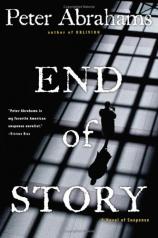End of Story: A Novel of Suspense
Review
End of Story: A Novel of Suspense
In his new novel, END OF STORY, Peter Abrahams opens with his main character, a struggling writer named Ivy Seidel. Here, "struggling" means that she's living in Brooklyn and working in Manhattan as a bartender. I suppose it's possible for a struggling writer to be based out of Red Bank, New Jersey or Laredo, Texas, but they always seem to end up in New York tending bar. This may not sound like a good long-term strategy, but it turns out that being a bartender in New York can mean that an editor from the New Yorker will walk into your establishment, order a Budweiser, and offer to read your next short story submission.
It turns out that Ivy, our plucky heroine, has a second job teaching inmates at the Dannemora Prison in upstate New York. Her best friend sells a screenplay to a Hollywood studio, and Ivy inherits the job. It turns out that the inmates --- including a looming Hispanic weightlifter, a serene African-American lifer, and a timid white Ivy League accountant --- have some hidden talents in the writing field. Furthermore, one inmate (who has real talent) may very well be innocent.
It's difficult to create unique, interesting characters. And from the bare bones outline I have just given you, it's possible to conclude that Abrahams hasn't done that here. Ivy's situation is overly familiar if not wholly trite, and the prisoners seem sent from Central Casting. Even the supporting characters --- Ivy's gruff but fair boss, the sympathetic prison guards, the worldly wise attorney --- are stiff and clichéd. But you can set all that aside.
Why? Because Abrahams knows his stuff. I can't give you details; you wouldn't want them anyway. The first clue you get is the short story that Harrow the inmate turns out --- brilliant, heartbreaking and spare. It ends at exactly the right time, too; Harrow tells us that the end of the story is the end, because nothing happens at the end of the story. It's one thing for Ivy to buy into this, but Abrahams makes the reader believe it too --- which is no small feat. Then, when Ivy investigates Harrow's alleged crime, all the facts are there but disordered and just out of phase --- the way that a writer would take events in his own life and distort them for dramatic effect.
Above all, there is Abrahams's considerable talent for writing suspense thrillers. The situations in which the characters appear may be tired and creaky, but the characters themselves are alert and interesting. And the dilemma in which Ivy finds herself after learning the facts regarding Harrow's crime is devious enough for the most dedicated enthusiast of the genre.
Is END OF STORY perfect? No. But it's unlikely that it ever would be. All it has to do is what it does --- get a few things right.
Reviewed by Curtis Edmonds on January 21, 2011





